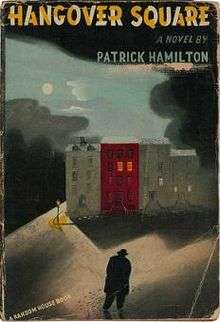Hangover Square
 Cover to the 1941 first US edition | |
| Author | Patrick Hamilton |
|---|---|
| Country | United Kingdom |
| Language | English |
| Genre | Black comedy |
| Publisher |
Constable (UK) Random House (US) |
Publication date | 1941 |
| Media type | Print (Hardback & Paperback) |
Hangover Square is a 1941 novel by English playwright and novelist Patrick Hamilton (1904–1962). Subtitled A tale of Darkest Earl's Court it is set in that area of London in 1939.
A black comedy, it is often cited as Hamilton's finest novel, exemplifying the author's concerns over social inequalities, the rise of Fascism and the hovering doom of World War II.
Synopsis
Set against the backdrop of the days preceding Britain declaring war on Germany, the main character is George Harvey Bone, a lonely borderline alcoholic who suffers from a split personality. He is obsessed with gaining the affections of Netta, a failed actress and one of George's circle of "friends" with whom he drinks. Netta is repelled by George but, being greedy and manipulative, she and a mutual acquaintance, Peter, shamelessly exploit George's advances to extract money and drink from him.
George suffers from 'dead moods' in which he is convinced he must kill Netta for the way she treats him. Upon recovering from these interludes, he cannot remember them. However outside these he embarks on several adventures, trying in vain to win Netta's affections, including a 'romantic' trip to Brighton which goes horribly wrong (Netta brings Peter and a previously unknown man with whom she has sex in the hotel room next to George's).
Apart from being a source of money and alcohol, Netta's other reason for continuing to associate with George is because of Johnnie. He is one of George's long-time friends who works for a theatrical agent, and Netta hopes that through him she will get to meet Eddie Carstairs, a powerful figure in the theatre. However, in a final reversal of fortune it is George, not Netta, who ends up attending a party amongst the theatrical great and good whilst Netta is cast aside by Eddie who (unlike George) has immediately seen her for the unpleasant person she is. George suddenly realises what it is like to be surrounded by 'kind' people who are interested in him as a person rather than what he can provide.
This potentially promising turn of events in George's life is, however, dashed, when he suddenly clicks into a dead mood and resumes his murder plans. He executes his murder of Netta (and also of Peter, whom the narrative describes as a 'fascist' moments before he is murdered) before escaping to Maidenhead. Throughout the novel, Maidenhead represents for George a semi-mythical new beginning, and representing a picture of traditional Englishness in contrast to the seaminess of Earl's Court. However, in the closing pages of the novel the stark fallacy of that dream becomes apparent to George. It is the same as everywhere else. Now penniless, he gasses himself in a dingy Maidenhead boarding house.
Title
The title of the book is a wordplay on the name Hanover Square, an area of London that was once home to many late-night drinking establishments.
Adaptations
The novel was adapted for film in 1945 starring Laird Cregar, Linda Darnell, and George Sanders. Significant changes to the novel were made. It was adapted to film once again in 2009 by Ansel Faraj starring Mihran Konanyan, Chloe Ginsburg and Faraj.
External links
- Hangover Square (1945) at the Internet Movie Database
- Hangover Square (2009) at the Internet Movie Database
- Novelist John Lucas on 'Hangover Square'